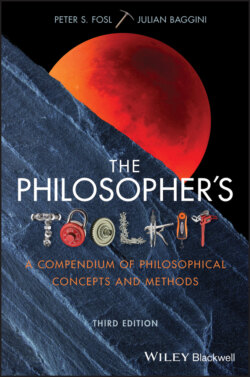Читать книгу The Philosopher's Toolkit - Julian Baggini, Julian Baggini - Страница 18
The place of reason in philosophy
ОглавлениеIt’s not universally realised that reasoning comprises a great deal of what philosophy is about. Many people have the idea that philosophy is essentially about ideas or theories about the nature of the world and our place in it that amount just to opinions. Philosophers do indeed advance such ideas and theories, but in most cases their power, their scope, and the characteristics that distinguish them from mere opinion stem from their having been derived through rational argument from acceptable premises. Of course, many other regions of human life also commonly involve reasoning, and it may sometimes be impossible to draw clean lines demarcating philosophy from them. (In fact, whether or not it is possible to demarcate philosophy from non‐philosophy is itself a matter of heated philosophical debate!)
The natural and social sciences are, for example, fields of rational inquiry that often bump up against the borders of philosophy (especially in inquiries into the mind and brain, theoretical physics, and anthropology). But theories composing these sciences are generally determined through certain formal procedures of experimentation and reflection to which philosophy has little to add. Religious thinking sometimes also enlists rationality and shares an often‐disputed border with philosophy. But while religious thought is intrinsically related to the divine, sacred, or transcendent – perhaps through some kind of revelation, article of faith, or ritualistic practice – philosophy, by contrast, in general is not.
Of course, the work of certain prominent figures in the Western philosophical tradition presents decidedly non‐rational and even anti‐rational dimensions (for example, that of Heraclitus, Kierkegaard, Nietzsche, Heidegger, and Derrida). We will examine the non‐argumentative philosophical methods of these authors in what follows of this book. Furthermore, many include the work of Asian (Confucian, Taoist, Shinto), African, Aboriginal, and Native American thinkers under the rubric of philosophy, even though they seem to make little use of argument and have generally not identified their work as philosophical.
But, perhaps despite the intentions of its authors, even the work of non‐standard thinkers involves rationally justified claims and subtle forms of argumentation too often missed. And in many cases, reasoning remains on the scene at least as a force with which thinkers must reckon.
Philosophy, then, is not the only field of thought for which rationality is important. And not all that goes by the name of philosophy is argumentative. But it is certainly safe to say that one cannot even begin to master the expanse of philosophical thought without learning how to use the tools of reason. There is, therefore, no better place to begin stocking our philosophical toolkit than with rationality’s most basic components, the subatomic particles of reasoning – ‘premises’ and ‘conclusions’.
